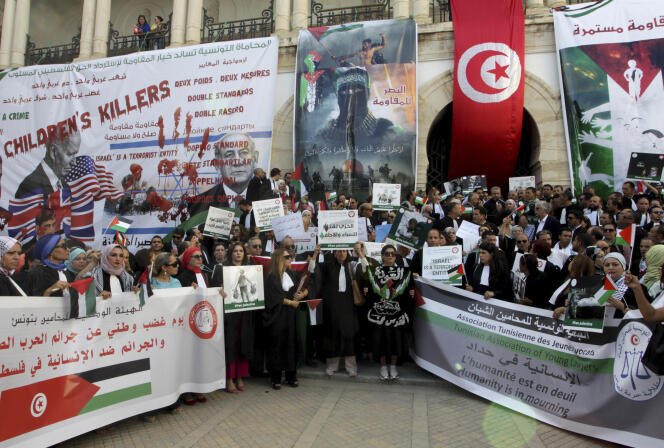


"From now on, the divorce is final:" The Moroccan weekly Tel quel made this diagnosis without mincing its words in a special report on October 20 on the "open rift between the West and the Global South" following the outbreak of war in Gaza between Israel and Hamas. While the relevance of the concept of "Global South" is debatable in this instance – India was quick to support the Israeli government after the Hamas terrorist attack of October 7 – the geographical locations of support are hardly debatable in the Muslim world, particularly in North Africa.
Here, where solidarity with the "Palestinian resistance" is long established, the anger is not just directed at Israel and its intense bombardment of Gaza, causing thousands of civilian casualties and an unprecedented humanitarian disaster. It extends to the West, perceived as an "unconditional" supporter of Israel. "Public opinion in North Africa equates Israel with the West," said Khadija Mohsen-Finan, a political scientist specializing in North Africa and a lecturer at Université de Paris 1 Panthéon-Sorbonne. "This is not because Israel is a Western-style state but because, in the current crisis, it is protected, even over-protected, by the American and European governments."
The war in Ukraine, in which the West invoked international law to obtain Russia's banishment, is on everyone's mind. The denunciation of "double standards," depending on whether the civilian victims are Ukrainian or Palestinian, has become a leitmotif in the case against the West.
In North Africa, France – with its sensitive colonial past – is a particular target for indignation on the street. In Tunis, several rallies were held in front of the French embassy, located in the heart of the capital. Demonstrators demanded "the departure" of the ambassador. The slogans sprayed on the facade of the French Institute in Tunis clearly reflect this degraded image of France: "Once a settler, always a settler," "France, country of rights only for certain men." The United States was also targeted, as was Germany, whose ambassador's remarks – referring to the "current escalation triggered by a barbaric terrorist attack by Hamas against Israel" – sparked an outcry in Tunisia. In Rabat as in Algiers, demonstrations in support of the Palestinians were united as they condemned the West's "complicity" in the "genocide in Gaza."
Faced with strong public opinion, each country is playing its own game. In Morocco, the royal palace walks a fragile line between the fervor of pro-Palestinian opinion and the strategic requirements of its rapprochement with Israel, sealed in 2020 as part of the Abraham Accords. In Algeria, the regime's long-standing refusal to "normalize" relations with Israel has been reinforced, but it intends to keep a tight rein on any popular movement likely to rekindle the flame of the Hirak, the harshly repressed protest movement of 2019.
You have 50% of this article left to read. The rest is for subscribers only.
